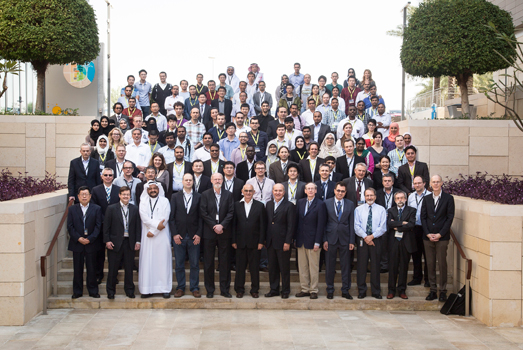KAUST Catalysis Center Research Conference fosters collaboration in important field

World leaders in catalysis research, including professors from KAUST and other international universities, assembled at the University for the Catalytic Carbon and Hydrogen Management research conference on February 1-4.
The KAUST Catalysis Center (KCC) hosted the KAUST Research Conference: Catalytic Carbon and Hydrogen Management on the University's campus on February 1-4.
The conference brought experts from around the world to discuss opportunities and advances in catalysis, a field at the forefront of many different scientific domains due to future energy needs and increasing concerns about protecting the Earth's environment.
KCC opened in 2011, and its research work focuses on a multidisciplinary approach to catalysis to achieve "catalysis by design." While concentrating on carbon and hydrogen management, researchers there connect their work to two of KAUST's main research thrusts, energy and the environment.
The conference featured talks and presentations by leaders in the field, including Caltech (U.S.) professor Dr. Robert Grubbs, winner of the 2005 Nobel Prize in Chemistry, Dr. Robert Waymouth from Stanford University (U.S.), Dr. Kazunari Domen from the University of Tokyo (Japan), and Dr. Bruce Gates from the University of California, Davis (U.S.).
"The opportunities for catalysis are vast in terms of carbon and hydrogen management," said event chair KAUST Professor Jean-Marie Basset. "There is an obvious need for very deep scientific approaches in this field with individual and collaborative efforts from homogenous, heterogeneous, photo-initiated, bio- and bio-inspired fundamental and applied systems."
Attendee and speaker Dr. Matthias Beller from Leibniz Institut für Katalyse (Germany) noted the conference "presented excellent scientific results of high-caliber and of significant relevance for the future development of society." He added that, as an external visitor, he was able to make contacts within a number of KAUST research groups. "I believe this will help foster future collaborations," he said.
"The conference was an opportunity for world leaders in each field of catalysis to gather together to address hydrogen production and carbon management," said speaker Kazuhiro Takanabe, KAUST Assistant Professor of Chemical Science. "The symposium was successful not only from the scientific point of view, but also in helping KAUST researchers network all over the world in this important field."
By Caitlin Clark, KAUST News

